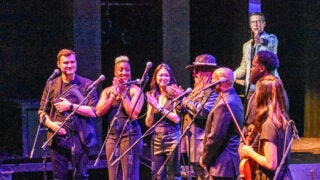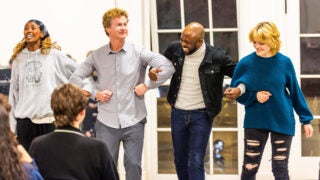Midori Goto brings hope, harmony and music to Sri Lanka
As the USC Distinguished Professor prepares for the next stage of her professional life, she looks back at a meaningful, memorable trip with students
[new_royalslider id=”205″]
The photo speaks a thousand words about Midori Goto and her mission in life.
In a room lined on two sides with as many as 20 wooden beds were disabled people. In the center of the room, Goto plays her violin. The room, one of seven in a home for people with disabilities in Sri Lanka, may speak of poverty and isolation, but for that moment there was music.
She could be anywhere: a concert hall in Los Angeles, a black-tie affair in Tokyo. But the girl who debuted as a child prodigy with the New York Philharmonic under Zubin Mehta and became known the world over as Midori has dedicated the past 25 years of her life to bringing music to underserved communities and young people.
A Distinguished Professor and holder of the Jascha Heifetz Chair in Violin at the USC Thornton School of Music, Goto was recently named a Judge Widney Professor of Music at the university. Created to honor USC’s founder Judge Robert Maclay Widney, the title is reserved for eminent individuals from the arts, sciences, professions and business.
“We are thrilled to announce this new title for Midori,” said Robert Cutietta, dean of USC Thornton. “She’s had a profound impact on our school, and we are excited for her to continue to work with our students for years to come.”
Midori Goto heals others through music
In March, Goto took eight current and former USC Thornton students, along with her studio pianist, to Sri Lanka for a week of performances and classes. She said the most meaningful part of the outreach was sharing it with students.
“I really enjoyed the chance to be together with my students,” Goto said. “It’s always meaningful to see my students committing themselves and giving themselves and doing the best they can to share their music.”
Goto’s violin studio students do plenty of outreach in Los Angeles, playing in jails, nursing homes, schools and other institutions. “This is an extension of that, but much more intense and also with a new culture, and it was really, really wonderful to see my students embracing it.”
Working with Chamber Music Society of Colombo
They started in Colombo, where the Chamber Music Society of Colombo is a ray of light in a nation still recovering from a 26-year civil war that ended in 2009. Then they traveled north to territories that had seen heavy fighting.
“We worked with string programs in schools in former battle zones,” Goto said. “They’re using music as part of bringing people together, healing.” Next, the group headed west to Galle, where a tsunami killed 30,000 people, before returning to Colombo.
Typically, their days were long: 7:30 a.m. to midnight or longer for those who got up earlier to warm up and practice the daily performance pieces. They performed two or three times a day at venues such as a school for blind kids, a school for the hearing impaired, homes for the elderly and music schools. Some days they rehearsed with the Chamber Music Society of Colombo in anticipation of the final concert of the trip — a collaborative USC/CMSC performance of solo pieces, piano sonatas and Vivaldi’s concerto for four violins.
“Perhaps the most striking of all the places was the facility for people with disabilities,” said alumnus Moni Simeonov, who started traveling with Goto on outreach trips through her Orchestra Residencies Program in 2009 as a student at USC Thornton. Simeonov has visited 30 American cities from North Dakota to Alabama and three other countries.
“Midori performed multiple pieces in all of the rooms, but most of us were able to only visit three or four. It was wonderful for us to see Midori’s unwavering focus, all while performing in 90 percent humidity.”
Goto said it was helpful to have experienced teachers, like Simeonov, who is director of string studies at the Bob Cole Conservatory at California State University, Long Beach, and alumnus Yabing Tan, who is on the faculty of the Shanghai University School of Music, with her on this trip. In addition to classes, workshops and coaching for the youth orchestra members in Colombo, Simeonov and Tan taught technique classes.
“They were addressing not just the students, but also their teachers,” Goto said, “on how to teach and how to work on technical fundamental elements of violin playing.”
Music education in small villages
In some of the villages, there is a strong system of music education in the schools, based on Venezuela’s well-known El Sistema, Goto said.
“The music programs are for their classical music, not Western classical. Western classical music is still very much of a novelty.”
And in some places, musicians have never had formal teachers or lessons. Wherever they went, Goto and her group were warmly received.
“All of these young violinists are so hungry for knowledge, ” she said, “and we were able to help them.”
Simeonov added: “There are many wonderful musicians from Sri Lanka, but nearly all of them live abroad. During the lengthy civil war, nearly all of the notable professionals, including the musicians, left the country.”
Artistic Director of the Chamber Music Society of Colombo Lakshman Joseph de Saram has taken the musical future of the country into his hands. He and his wife arranged all of their activities and created a snowball effect, giving motivation to the small number of local music teachers and raising money for instruments and to grow the programs, Simeonov said.
Deep roots at USC Thornton
Given the bonds she has forged with her USC Thornton students in the studio and through outreach, Goto has mixed feelings about her next trip to the Curtis Institute in Philadelphia. She is excited about joining the institute’s faculty, but her USC roots go deep.
“I was at USC for close to 15 years, and it’s very dear to me,” she said. “It’s a place where I really came into being. It’s a very, very important part of my life, to be there, to teach there and to lead the department. I’m going to miss what I was able to do in L.A. I found myself, who I am right now, in L.A.”
She will continue to teach and inspire students at USC Thornton as a Judge Widney Professor of Music, mentoring students, giving master classes and workshops and more.
“I have a strong emotional connection to the school,” Goto said, “and I am very honored and moved that the dean and the president decided that they would keep that connection with me by giving me this new title.”
That means USC Thornton students will continue to have life-changing experiences like Chang He, who has performed music for the elderly and orphans in L.A. and joined Goto in Sri Lanka and in Mexico last year.
“The most important thing I learned is love,” he said. “I remember I was touched the first time by a very old lady who was lying on the bed in the hospital. After I played, I saw she was smiling and there were tears in her eyes. I realized that it’s a spirit of love I had never found before, and this is something I could do for people as a musician.
“I appreciate Ms. Goto very much for making me a better person.”



